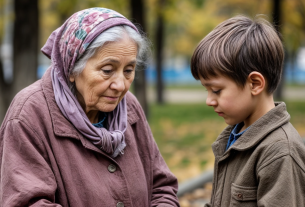— “Well, we ought to help her!” the husband urged.
— “We ought to. Only I honestly don’t feel like it,” Inna said.
Her husband Semyon looked reproachfully at his wife but said nothing. He knew his mother and his wife didn’t much like each other; to be frank, they barely tolerated one another, maintaining a kind of truce. And to spare his own nerves, he took a neutral position—“neither ours nor yours,” as Inna put it.
Semyon didn’t like arguments. But how could you do without them? Sometimes they happened anyway. Semyon’s mother was very proud and headstrong, yet still a good woman. At least, he loved her as she was, and he didn’t have another…
— “And I never will!” he would sometimes declare to Inna. “What are we supposed to do—re-educate her? My mother? How do you imagine that?”
— “No way, of course,” Inna would sigh. She decided she could simply be polite with her mother-in-law—but rarely. Then things would be more or less normal.
A month after Semyon and Inna got married, Olga Petrovna told her son that his bride should regularly come over to her place to help with the cleaning and various little chores. She wasn’t a young woman anymore, she said, and it was hard for her.
Semyon looked at his mother in surprise. She didn’t look seriously ill. Not long ago she’d been briskly running around shops and setting off a top-to-bottom deep clean of the whole apartment at once, dashing off on day trips to another city, strolling, riding a bicycle, skating in winter—and now… help, suddenly…
He shrugged but passed the request along to his wife.
Inna was surprised too when she heard him out.
— “What exactly does she need help with?”
— “Inna, I don’t know… Maybe you could just go?” Semyon asked, feeling a bit foolish.
— “I’m not going! I’ve got a ton to do myself,” Inna said. “If it’s something specific, we can both come on a weekend and help. But this… it’s nonsense.”
And she didn’t go.
They lived in Inna’s apartment, which her parents had helped her buy when she turned twenty-five, before she got married. Her parents soon moved to another city, fairly far away: Inna’s father had been offered a good position at a branch of his company.
Inna loved her apartment and constantly made it cozy. She washed, scrubbed, did laundry, ironed, and sewed. Their home was always tidy and welcoming—Inna was an excellent homemaker. She made the curtains, the bed linens, various kitchen towels, decorative pillows, and much, much more herself. She loved to do handicrafts. So there was always truly something to do at home.
Olga Petrovna took offense at her daughter-in-law.
— “What a little princess! Tell her I’m offended!” she announced to Semyon.
Of course, he didn’t pass anything along. He kept quiet.
When a grandson was born, they still didn’t see each other and hardly spoke; the event didn’t bring them any closer.
The baby was born with a small issue: his neck was a little crooked.
— “Torticollis,” the neonatologist told Inna in the maternity ward. Baby Genya was five days old, and they were being discharged that day.
— “What should we do?” Inna asked timidly.
— “Nothing serious. Massage, therapeutic exercise—it will pass, it will straighten out, everything will be fine,” the doctor smiled.
— “Inna should’ve moved around more during pregnancy, but she sat at that computer of hers day and night, working. You can’t earn all the money in the world!” Olga Petrovna said, putting on her glasses and critically examining a photo of the newborn grandson on Semyon’s phone. “The child lay in one position the whole pregnancy, on one side, so the neck developed asymmetrically. Young and foolish! You don’t understand anything.”
— “Oh, Mom!” Semyon protested. “The doctor didn’t say anything like that—everything was fine.”
— “Fine is fine, but not really fine. He’ll walk around with a crooked neck his whole life! See—his cheeks are different, and one ear is higher than the other,” declared Olga Petrovna.
Semyon couldn’t take it and carefully but firmly took the phone out of his mother’s hands. He felt hurt—and even a little resentful, as if he had displeased his mother by having a not-quite-symmetric son! And now she was voicing complaints as if about a poorly done job.
Stung and irritated, he couldn’t hold back and told Inna about the conversation with his mother. Inna became even more upset and said she didn’t want to see her mother-in-law in their home. Let her not even come to look at the baby!
And as it turned out, Olga Petrovna hadn’t been planning to come anyway. Which offended Inna once more.
And so it went on and on: grievance upon grievance. And silence. And Semyon served as the link between them—and the buffer.
Within a month, the baby’s neck straightened out, and his cheek too, and his ears leveled. The couple found a massage therapist specializing in infants who came to the house every day, and Inna herself tried hard—she did exercises with the baby, put him to sleep on the opposite side on a little roll, and did many other things the doctor had explained.
— “The neck is only the visible problem,” Olga Petrovna grumbled when her son told her that the baby was fine. “Who knows what accompanying disorders there might be. He needs to be thoroughly checked.”
— “Mom! Don’t jinx it, for heaven’s sake!” Semyon got upset again, then said loudly and clearly: “My son. Is. Fine.”
— “Why are you shouting?” his mother objected. “Fine then, fine. Here, give this to Inna—let her buy Genya a present from me.”
Olga Petrovna handed Semyon a thousand rubles. Semyon scratched his head and took it. He didn’t dare refuse, afraid of offending his mother, but he thought to himself: what kind of gift can you buy a two-month-old for a thousand rubles? A pack of diapers? And why still hadn’t his mother managed to come visit them? It was baffling—and hurtful…
One day, when Genya had already turned one, Olga Petrovna informed Semyon that she’d decided to have her apartment renovated. Not a big one, just cosmetic.
— “But it’ll be impossible to live there! Dust, racket, dirt,” said Olga Petrovna. “So, I want to stay with you during that time. Two weeks.”
— “With us?!” Semyon was surprised. He had once more come by to visit his mother, to see her and share the news.
— “With you,” Olga Petrovna repeated. “What, is that not allowed?”
— “I don’t like the idea,” Inna said. “But fine. What can we do.”
— “Come on, Inna. A mother is a mother. How can I refuse her?” Semyon fussed. Once again, he felt out of place.
— “You can’t, of course!” Inna said irritably and went over to the crib where the baby was crying. She thought that you needed to keep friendly relations with people and not spit in the well the way her mother-in-law had. Well, there it was—she’d had to ask!
— “By the way, she promised to help you,” Semyon said.
— “Much obliged,” Inna said with a touch of sarcasm. She changed the baby’s diaper and dressed him. It was time for a walk…
On Sunday evening, Olga Petrovna arrived at their place with a big bag and her son in tow.
Early Monday morning, as usual, as soon as Semyon left for work, Genya woke up. Inna washed the baby, changed him, fed him breakfast, ate herself, and got down to chores. She loaded the laundry, cleaned the bathroom and toilet, wiped the floor in the hall and kitchen, scrubbed the small entryway rug with a brush. By then the machine had finished, and Inna hung the laundry out on the balcony. A couple of times during that stretch Genya started crying—his blocks fell and the tower just wouldn’t stand, or his mood simply soured and he burst into tears.
When Inna had calmed him yet again and started making lunch, her mother-in-law came out of the room. The clock read eleven-thirty.
— “You’re awfully noisy! I can’t sleep. I am on vacation, after all,” she grumbled and swept into the bathroom without even glancing at her grandson.
Inna shrugged and said nothing. Then she and Genya went for a walk, and when they came back, Inna found a mountain of dishes in the kitchen sink. And in the hamper lay a crumpled towel—the one she had put out for her mother-in-law just that morning. The mother-in-law herself had gone out. She was nowhere to be seen.
— “Some help! She didn’t even wash up after herself,” Inna said in exasperation, dropping Genya’s little jumpsuit in surprise.
She had to drop everything and wash the dishes.
She couldn’t make it to the doctor either. Her mother-in-law, of course, didn’t stay with the baby, not even for an hour.
— “Olga Petrovna, the clinic is right across the street! I’ll be back quickly,” Inna said.
— “No. It’s a big responsibility; I’m not used to him yet,” the mother-in-law said.
Inna wanted to say, “Used to him—how? We haven’t even seen each other all year!” But then Semyon came home from work and promised that next week he’d take a half day specifically to stay with Genya while Inna went to the doctor…
There was no help at all. The cleaning still fell to Inna (“I don’t know where you keep anything,” her mother-in-law said), as did the cooking (“Two women in a kitchen is a bad idea,” said Olga Petrovna), and she wouldn’t watch the baby for even five minutes (“We’re not used to each other yet, and I don’t know how anymore; I’ve forgotten everything,” the mother-in-law said).
By the end of the second week, Inna was even more exhausted from such “help.” A stranger in the house was stressful. She had to keep quiet until lunchtime, cook more, and also clean up and wash after her mother-in-law.
— “I was swindled!” Olga Petrovna screeched over the phone to Semyon so loudly that he had to hold the receiver away from his ear. “There was no renovation! Workers just lived in my apartment for two weeks!”
— “What?!” Semyon was astonished.
— “Yes! I came in and found utter chaos! Dirt everywhere, trash, cigarette butts, rags—someone burned the linoleum in the kitchen. Soot on the ceiling above the stove! What were they burning there, campfires? The stove itself is all sooty. The toilet’s filthy, the tub is black—I’ll have to scrub everything. It’s awful!”
While staying with Inna and Semyon, Olga Petrovna had periodically called the foreman to ask how things were going. She’d been cheerily told that everything was fine; they even sent photos with cans of paint, glue, and wallpaper. But it turned out there had been no renovation at all. The apartment had simply been rented out to three laborers from Tajikistan. She’d almost caught one of them red-handed, but he ran off quickly.
— “I told you we should go home together that evening, but you didn’t wait—you went alone,” Semyon said.
— “I wanted to go home and was dying to see the finished renovation,” his mother cried.
— “And did you see it?” Semyon asked. “Did you call the police?”
— “Yes. But they said it’s unlikely they’ll find them. They came and went quietly, early in the morning and late at night; no one really saw them, they didn’t make noise. There are no cameras in our building. The foreman’s number I’d been calling is blocked and won’t answer… Now I need another renovation—only not a cosmetic one,” Olga Petrovna wept.
— “God isn’t blind—He sees who deserves a knock,” Inna murmured softly when she heard the news from her husband. “Let her move in with us again; what else can we do.”
— “Her vacation is ending. I don’t know how she’ll manage—work and live with us, since her commute from here is long,” Semyon said with a sigh.
Inna was silent. She didn’t know what to say.
— “It’s good I only gave them part of the money, an advance!” Olga Petrovna said to Inna, watching her deftly change Genya, fastening the tiny snaps on his clothes. The grandson smiled sweetly and babbled something.
— “Let me, please,” the mother-in-law suddenly asked shyly.
Inna stepped away from Genya, who was sitting on the bed, yielding her place to Olga Petrovna.
— “What a darling, Inna!” the mother-in-law said, lifting admiring eyes as she carefully put a cap on the baby. “He looks just like my grandfather! Spitting image! A dashing general, by the way… Go on, cook something or have a rest—we’ll go for a walk.”
Inna stared in surprise, at a loss for words. Her mother-in-law neatly placed her grandson in the stroller and wheeled it out to the landing. Turned out she could do everything, knew how, and hadn’t forgotten.
From then on, the real help began. Olga Petrovna grew very attached to her grandson and didn’t want to let him out of her sight, even for a minute. She took another two weeks off at work. She had fourteen unused days accrued for hazardous working conditions. She worked at a hazardous facility, in a chemical laboratory.
Semyon, meanwhile, took care of the renovation at her apartment. He found the workers himself, lived there the whole time, and supervised them.
— “A friend in need is a friend indeed,” Olga Petrovna said. “You’ve helped me so much, kids. For some reason I just couldn’t step over this line—something kept me from interacting normally with you. I was irritated, torn apart. And then I understood…”
Inna and Olga Petrovna were talking while sitting on the couch. Genya was playing with his stacking rings on the carpet nearby.
— “I realized I’m simply jealous. I’m jealous of my son for you, and of Genya for both of you. And who knows whom I’m jealous of and of whom! I have a difficult character, prickly. And the shock I felt when I saw what had become of my apartment helped me understand that. I was scared. Where to run? To whom? And I thought that I’d been wrong to push you away! Who else would I turn to? All my relatives have died… From the start I wanted you to come to me with the baby on your own, but I didn’t say it—I wanted you to guess it yourselves. And so I got mad at you, took offense, was spiteful, and didn’t come visit. And when I decided on the renovation and came, I didn’t know how to approach you,” the older woman confessed.
Olga Petrovna brushed away a tear, stood up, took a children’s book for Genya from the shelf, then sat him on her lap and began to read nursery rhymes aloud.
Semyon came into the room and sat down next to Inna. They put their arms around each other and looked at Olga Petrovna. They were thinking the same thing: that people are all different, everyone has their own quirks, and you have to adjust to one another, sometimes compromise, setting aside your pride and grievances.
— “And then everything will be fine,” Semyon said out loud.
— “I don’t even want to leave you now—I’ve gotten so used to it,” Olga Petrovna said with a smile.
— “No, Mom,” Semyon smiled. “It’s time for you to get back to work, and we’ll manage here somehow—just the three of us, as a family.”
— “Throwing me out?” his mother asked, putting her hands on her hips.
— “Not at all,” Semyon smiled. “Don’t worry—someday we’ll start a renovation too and move in with you for a while. One good turn deserves another.”
— “How mercenary you two are!” Olga Petrovna protested in jest, and everyone laughed.



